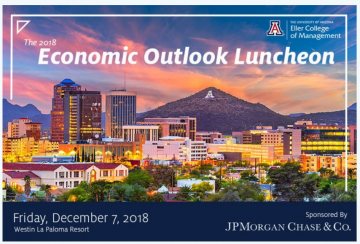Tucson is back on track, but can it last?
Tucson posted its strongest job growth since 2012 last year and has sustained that momentum into 2018. While most new jobs were in service-providing sectors, both construction and manufacturing added nearly 1,000 jobs each in 2017, which was much improved performance. Overall, Tucson is back on track, generating solid gains in jobs, population and, to a lesser extent, income.
With the Tucson economy gaining momentum, construction activity has surged. Single-family house prices are rising at the fastest pace in years. While there are clear signs of strength, rising mortgage rates, labor shortages and increasing raw materials prices beg the question: Is the local housing market in the red zone and headed for a correction?
International trade remains a key economic and political issue, with tariffs rising and U.S. trade relationships changing significantly. Will Arizona’s exports finally start growing again or are we in for more sluggish performance?
Federal government activity is a much bigger part of Tucson’s economy than it is for the state or nation. While federal spending has been rising, how long can that last? What will happen to local growth when federal activity slows again?
The national economy continues one of the longest economic expansions on record. Gains have been spurred in part by tax cuts and increased federal spending. Will that be enough to sustain growth through 2019? Will rising interest rates derail the expansion? What other risks are on the horizon and what would a national downturn mean for Tucson?
Presenter Bios

George W. Hammond, PhD Director and Research Professor Research Center
George W. Hammond brings a wealth of experience in state and local econometric forecasting and regional economic analysis, as well as wide-ranging academic research interests to bear on his role as director of the Eller College’s Economic and Business Research Center. A specialist in econometric forecasting for more than 20 years, he has designed, built and used economic models to produce more than 100 forecasts for state and local economies, and completed more than 50 regional economic studies on topics including economic and workforce development, energy forecasting and the impact of higher education on human capital accumulation.

Anthony Chan, PhD Chief Economist Chase
Anthony Chan joined J.P. Morgan in 1994 and currently serves as the chief economist for Chase. His responsibilities include economic analysis and research in support of Chase and the Private Bank’s Global Investment Committee. A member of several forecasting panels, Chan received his bachelor’s degree in finance and investments from Baruch College in 1979 and his master’s and PhD degrees in economics from the University of Maryland. After completing his doctoral studies, he was a professor of economics at the University of Dayton. He served as an economist at the Federal Reserve Bank of New York from 1989 to 1991 and was a senior economist at Barclays de Zoete Wedd Government Securities from 1991 to 1994.
The Outlook is a product of the Forecasting Project. With a 30-year history, these forecasts are widely recognized for accuracy and for providing lucid insights into what the future holds.
The annual luncheon is presented by the Eller College of Management in cooperation with the University of Arizona Foundation.
Learn more about the Economic and Business Research center at its award-winning website ebr.eller.arizona.edu, the premier source for information on Arizona’s economy. There you will find measures of the economy’s performance, analysis by the Eller College Economic and Business Research Center, and links to important studies. You may also view the latest issue of the award-winning Arizona’s Economy newsletter on the website.
We thank our Economic Outlook Luncheon sponsor:
More Information
- Call 520.621.1811
- outlook@eller.arizona.edu






